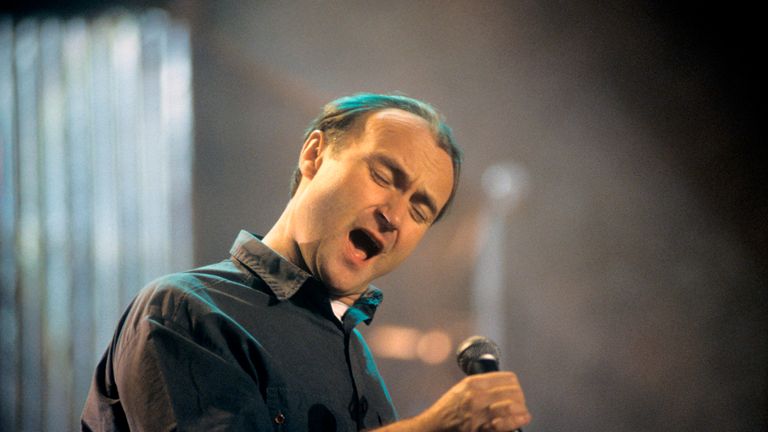‘The Phil Collins Effect’: Older pop stars given hope by former Genesis singer’s cultural resurrection | Ents & Arts News
[ad_1]
The “Phil Collins Effect” has been identified by academics after a return to popularity for the former Genesis drummer and frontman.
The highly-influential musician, who appears to attract equal levels of admiration and derision, became one of the best-selling artists of all time during a hugely successful solo career in the eighties.
But as the UK entered the Britpop era in the 1990s, the balding singer-songwriter came to represent the epitome of uncool.
Academics have since identified a phenomenon called “The Phil Collins Effect” (PCE) after a viral video caused the singer to enjoy a surge in popularity among the younger generation last year, The Times reports.
The research, led by Andre Spicer, a professor of behaviour at City, University of London, says PCE can be plotted in an N-shaped graph with each phase of popularity, or lack of popularity, lasting about 10 years.
In Collins’ case, this graph tracks his rise to popularity as a top solo artist in the eighties, his fall from grace in the nineties, and then a period from 2001 when his work was “critically elevated to an even higher status than during its commercial peak”.
Tim and Fred Williams, 21-year-old twins from Gary, Indiana, are seen praising Collins’ classic track In The Air Tonight in the social media video that prompted the research.
In the clip, which has had nine million views, the brothers are seen bobbing their heads as their facial expressions clearly show they are enjoying the music.
Collins’ legendary gated reverb drum fill at around three minutes then lifts the song and the brothers are blown away.
When the song is over, Fred cries: “You killed it Phil!”
In The Air Tonight immediately went to number one on US college radio stations after the video.
The Guardian and The New York Times wrote pieces about the clip and praised not only the song, but Collins’ solo career as a whole.
Mr Spicer and his co-authors observed that the video led to press coverage and critical praise of Collins that was even greater than in his heyday.
Mr Spicer told The Times: “The video by (the brothers) made me reflect on the fact that when you go to a hipster bar in Hackney you now hear Phil Collins playing.
“That wouldn’t have been the case some years ago. So I thought what’s going on here?”
The observation that acts can fall from favour before returning to popularity is not seen as particularly groundbreaking, but Mr Spicer said it was his team’s analysis that was pioneering.
He continued: “We’re the first team in the sociological and business study of popular music to identify this curve.”
The researchers say the PCE is a pattern of “cultural death followed by cultural resurrection”.
They added the effect is dependent on three groups over successive generations – fellow musicians, critics and fans.
The authors said the phenomenon is fuelled in part by a desire from new generations to cast off the cultural baggage of their elders.
The researchers also said the actions of an artist in seeking to continue or a revive a career have little bearing on whether they would come back stronger after a drop in popularity, or simply fade away like the majority of acts.
The authors said Collins had done himself a favour by failing to reinvent himself.
Mr Spicer said the Bee Gees were among other artists to have followed a similar trajectory.
[ad_2]
Source link












